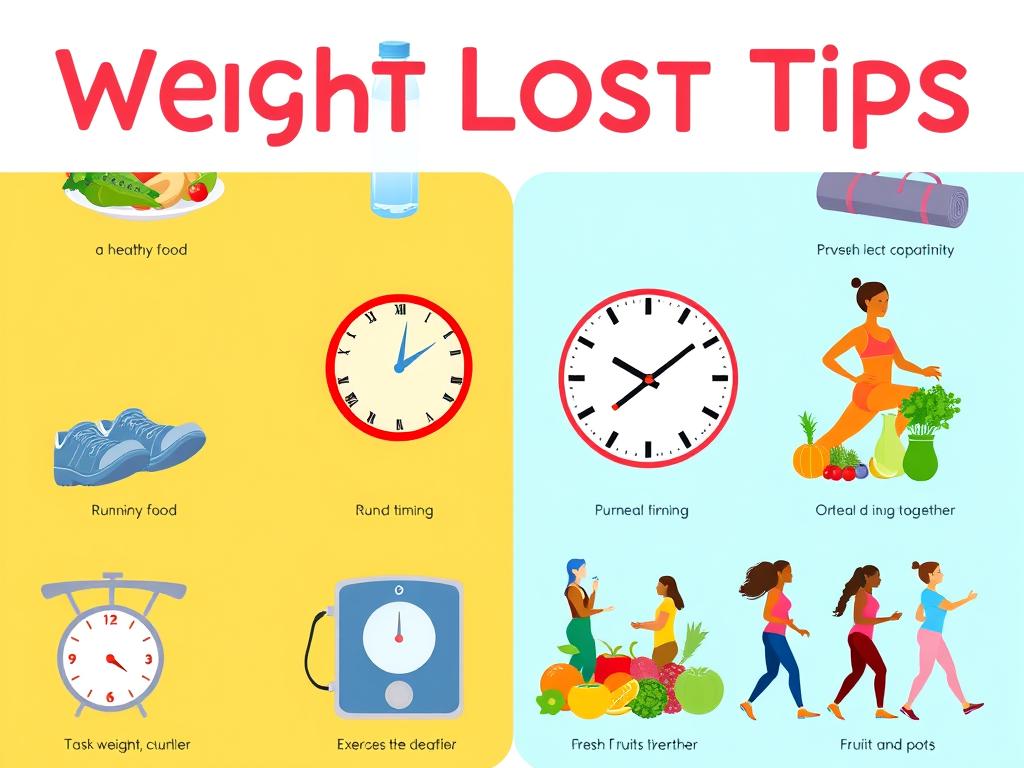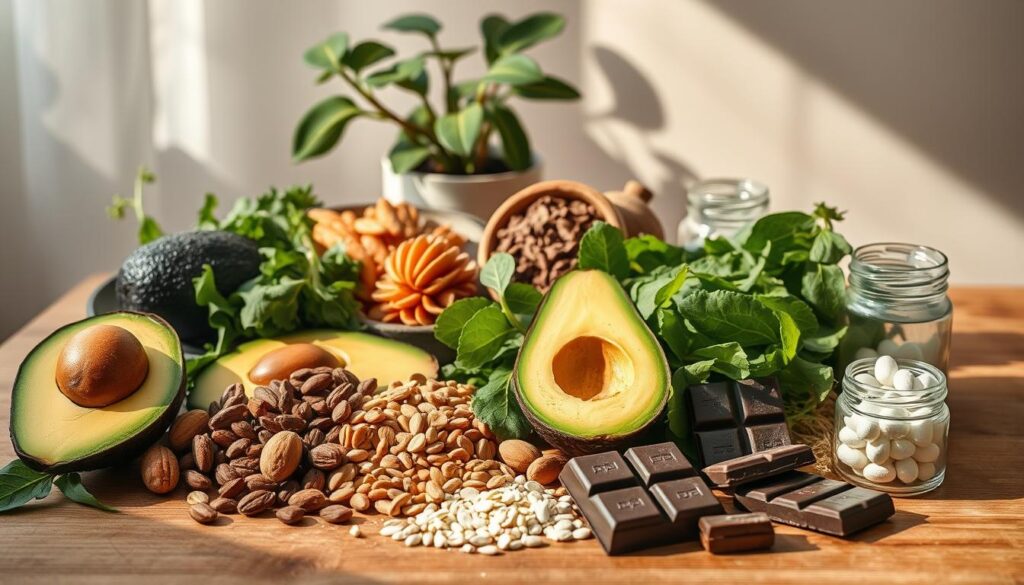Did you know that only about 12% of the U.S. population is meeting their daily fruit intake needs, while a mere 10% is hitting the mark for vegetables?
This highlights a significant area of improvement for many looking to embark on their weight loss journey. Achieving healthy weight loss can often seem daunting, but the key lies in simple weightloss tips that anyone can integrate into their daily routine.
In this article, we will discuss 8 Practical and Easy-to-Follow WeightLoss Tips designed to promote sustainable change without overwhelming lifestyle alterations.
Understanding the right balance in your diet and activity level is crucial. For instance, the American Heart Association recommends 150 minutes of moderate-intensity physical activity each week, offering a framework for effective weightloss tips and strategies. Along with this, celebrating small wins and creating consistent habits can greatly contribute to your long-term success.
The journey doesn’t have to feel lonely; building a supportive environment can serve as a motivator, reminding you of the benefits of healthier choices. To explore more about how small actions can lead to big results, consider visiting this resource.
Key Takeaways
- Small, consistent actions can lead to significant weight loss results.
- Setting realistic and achievable goals keeps motivation high.
- Regular physical activity is essential for effective weight loss.
- Meal planning can lead to healthier choices and better portion control.
- Hydration plays a vital role in the weight loss process.
Understanding the Basics of Weightloss Tips
Embarking on a journey of weight loss requires a solid understanding of foundational concepts. One crucial aspect is the calorie deficit, a fundamental principle that states burning more calories than consumed leads to weight reduction. Creating this deficit can be achieved through a combination of diet and physical activity.
What is a Calorie Deficit?
A calorie deficit occurs when your body expends more energy than it receives through food intake. This balance is vital in the process of understanding weight loss. For instance, if you consume 2,000 calories daily but burn 2,500, a deficit of 500 calories supports weight loss. It’s essential to approach this goal realistically; losing one to two pounds per week is deemed safe and sustainable. Various factors such as metabolic rate, activity level, and nutritional choices impact this deficit.”

Importance of Nutrition
Proper nutrition for weight loss cannot be ignored. Emphasizing a balanced diet rich in fruits, vegetables, whole grains, and lean proteins is essential. Integrating healthy options fosters not only a calorie deficit but also long-term health benefits. The Mediterranean diet, for example, showcases how good fats and carbohydrates can be effective weight loss tips, including foods like nuts, fish, and olive oil. Tracking your food intake with smartphone apps or journals can aid in maintaining a calorie deficit, while focusing on nutrient-dense choices allows for healthier eating patterns.
Lack of sleep can disrupt this delicate balance, stimulating appetite and potentially leading to overeating. Another important factor comes from the Mayo Clinic Diet, which promotes healthy habits to reduce risks related to weight gain. The program advises individuals to lose an initial 6 to 10 pounds in the first two weeks and continue shedding weight gradually, fostering an understanding that nutrition and healthy choices play pivotal roles in maintaining a calorie deficit and sustainable weight loss.
For a deeper understanding that can enhance your nutritional approach, explore the importance of Vitamin C which supports overall health while on a weight loss journey.
Set Realistic Goals
Establishing realistic weight loss goals forms the cornerstone of a successful health journey. Understanding the balance between short-term and long-term goals can pave the way for sustainable progress. Smart goal-setting not only fosters motivation but can also lead to measurable outcomes in your weight loss journey.
Short-term vs. Long-term Goals
Setting short-term and long-term weight loss strategies serves distinct purposes. Short-term goals, such as losing 1–2 pounds a week, create immediate milestones that keep you engaged. The CDC recommends this safe rate for effective weight management alongside a monthly weight loss rate of 4–8 pounds. In contrast, long-term goals should encompass broader aspirations like achieving a 5–10% reduction in body weight. This strategy aligns with the National Heart, Lung, and Blood Institute’s recommendations, emphasizing achievable targets that foster long-lasting changes.
How to Measure Your Progress
Measuring progress in weight loss can go beyond the numbers on a scale.
Keeping a food diary or utilizing mobile apps can be excellent methods for tracking daily intake and habits. Participate in regular weigh-ins and also recognize nonscale victories, such as improved energy levels or better-fitting clothes.
Incorporating a structured approach, aided by tools like the Body Weight Planner from the National Institute of Diabetes and Digestive and Kidney Diseases, can customize plans based on personal goals. These weightloss tips are designed to help track progress effectively. Research indicates that those who set and monitor clear objectives often see a substantial increase in achievement.
In one study, participants who established dedicated goals lost an average of 65% more weight over a year compared to those who did not prioritize goal-setting.

Adjust your goals as necessary, based on your progress and changing circumstances. A flexible mindset encourages commitment and resilience. Connecting with supportive communities can enhance this journey, promoting accountability and encouragement while ensuring your path remains both fulfilling and balanced as you reach for your desired outcomes. For more insight into personal growth strategies, explore setting achievable goals in various life areas.
Incorporate More Physical Activity
Integrating regular physical activity into your daily routine plays a crucial role in achieving weight loss goals. Engaging in physical activity for weightloss not only enhances overall health but also aids in maintaining a balanced lifestyle. Research shows that combining different types of exercises can yield effective weight loss techniques. The American Heart Association emphasizes a target of 150 minutes of moderate-intensity activity each week to reap numerous benefits.
Types of Exercise to Consider
Incorporating a variety of exercises keeps your routine engaging and effective. Below are some types of exercises that you might consider:
- Brisk Walking: A simple yet effective way to get moving.
- Strength Training: Increases muscle mass, which can enhance metabolism.
- High-Intensity Interval Training (HIIT): Helps burn more fat compared to steady-paced workouts.
- Recreational Activities: Dancing, swimming, or playing sports can make exercise fun.
Studies indicate that individuals who combine cardiovascular exercise with muscle-strengthening workouts are likely to experience better health outcomes. It’s important to choose activities that you enjoy to maximize adherence and results.
How to Stay Motivated
Staying motivated for weight loss can be challenging. Here are some strategies to keep your energy high:
- Set realistic fitness goals. Aim for achievable milestones to celebrate progress.
- Engage friends or communities for support. Exercise with others can enhance accountability.
- Incorporate small physical activities throughout your daily routine, such as taking the stairs instead of the elevator.
Creating a supportive environment can significantly contribute to staying motivated for weight loss. Additionally, resources like quick and nutritious breakfast ideas can provide the necessary fuel for morning workouts, ultimately supporting your weight loss journey.
Meal Planning and Prepping
Effective meal planning for weight loss can significantly enhance your journey toward a healthier lifestyle. By preparing meals in advance, you can ensure that you have nutritious options readily available, which saves time and helps you avoid impulsive food choices. This approach aligns with the benefits of meal prepping, which can promote consistent eating habits and support your healthy weight loss advice.
Benefits of Planning Your Meals
Meal planning not only encourages healthier food choices but also reduces food waste and stress associated with last-minute cooking. With a structured meal plan, you can control portion sizes and ensure you’re consuming enough protein and fiber-rich foods that keep you fuller for longer. These nutrients are key to preserving lean muscle mass and curbing cravings. Whole, minimally processed foods should be prioritized, avoiding ultra-processed options that can hinder weight loss efforts.
Quick and Easy Meal Prep Ideas
Getting started with meal prepping can be simple. Begin by creating a shopping list that includes:
| Category | Examples |
|---|---|
| Fruits | Berries, apples, bananas |
| Vegetables | Spinach, broccoli, bell peppers |
| Proteins | Chicken, tofu, beans |
| Grains | Brown rice, quinoa, oats |
| Healthy Fats | Nuts, seeds, olive oil |
| Snack Foods | Hummus, yogurt, fruit bars |
Consider preparing meals in bulk, opting for easy meal prep ideas like batch-cooking grains or roasting vegetables. It is recommended to eat refrigerated meals within 3–4 days and frozen meals within 3–6 months to maintain freshness. For breakfast, nutrient-dense options like those found in healthy breakfast recipes can jumpstart your day with energy.
Incorporating versatile ingredients such as cabbage can enhance meal variety while promoting digestion and immunity. Discover some easy cabbage recipes that cater to different tastes.

Stay Hydrated
Hydration plays a vital role in weight loss. Water is essential for various bodily functions and helps to control appetite, preventing individuals from mistaking thirst for hunger. Understanding the benefits of drinking water can encourage better choices, while the emphasis on increasing water intake can support natural weight loss tips that lead to more effective weight management.
How Water Affects Weight Loss
The human body consists of around 60% water, underscoring its importance.
Staying adequately hydrated boosts metabolism and assists in breaking down fat. Some studies even indicate that drinking water before meals can lead to reduced caloric intake, supporting weight management efforts.
Additionally, some individuals may notice water weight fluctuations due to factors like high salt consumption. Such fluctuations are typically temporary and harmless, yet persistently high water retention might indicate underlying issues that require medical attention.
Creative methods, such as utilizing flavor enhancers like lemon or herbal teas, can also make hydration for weight loss more enjoyable.
Tips for Increasing Water Intake
To boost hydration, consider implementing the following strategies:
- Carry a reusable water bottle to track daily water consumption.
- Set reminders on your phone to drink water at intervals throughout the day.
- Incorporate water-rich foods such as cucumbers, oranges, and watermelon in your diet.
- Replace sugary drinks with water to reduce overall caloric intake.
- Experiment with sparkling water or herbal teas for variety.
For more details on daily water requirements and the benefits of hydration, consider exploring additional resources. Sustained hydration not only supports weight loss; it can also enhance overall health and wellness.
| Age Group | Daily Water Intake Recommendation (liters) | Notes |
|---|---|---|
| Children (4-8 years) | 1.2 | Needs vary based on activity level |
| Teens (9-13 years) | 1.8 | Increased needs during growth spurts |
| Adult Women | 2.2 | Includes all fluids consumed |
| Adult Men | 3.0 | Consider physical activity levels |
Mindful Eating Practices
Mindful eating plays a crucial role in developing healthy eating habits, focusing on awareness during meals and addressing emotional responses to food. By incorporating mindful eating for weight loss, individuals can cultivate a deeper connection to their food, differentiating between physical hunger and emotional cravings. Studies show that employing multiple mindfulness strategies can significantly aid in weight loss and address disordered eating behaviors.
What is Mindful Eating?
Mindful eating involves paying close attention to the eating experience. This practice encourages individuals to savor each bite and notice flavors, textures, and aromas, enhancing overall meal satisfaction. Listening to hunger and fullness cues is essential, as it enables better control over portion sizes, reducing the likelihood of overeating. Research indicates that emotional eaters who listen to music while snacking consume about half as much as those who eat in silence, exemplifying how distractions might influence eating behaviors.
Techniques to Practice Mindfulness
Implementing practices to increase mindfulness can lead to significant improvements in eating habits. Here are several effective techniques:
- Savoring Each Bite: Take the time to fully enjoy your food. Focus on the taste and texture, which can enhance satisfaction.
- Reduce Distractions: Try to eat away from screens or noisy environments that can divert attention from your meal.
- Wait Before Eating: Allowing some time between meals can prevent strong hunger pangs, which may lead to unhealthy food choices.
- Keep a Food Journal: Documenting your meals can help identify patterns in eating habits and triggers for emotional eating.
- Practice Mindful Chewing: Taking the time to chew thoroughly promotes better digestion and helps the brain register fullness.
Incorporating mindful eating techniques can lower body weight, as highlighted by studies showing its effectiveness comparable to traditional diet programs. As mindful eating discourages emotional and external eating, it supports healthier food choices and enhances overall well-being. For those interested in a nutritional powerhouse to complement these practices, incorporating avocados into your diet can provide essential vitamins and minerals for sustained energy and health, while also being versatile and enjoyable. Explore more about the benefits of this superfood here.
Building a Support System
Establishing a solid support system can play a pivotal role in achieving your weight loss goals. Finding reliable accountability partners in weight loss—whether they are friends, family, or even a coach—can provide the encouragement and motivation needed during challenging times. Having someone who understands your journey helps create a sense of responsibility, making you less likely to stray from your goals. Engaging in open conversations about your progress can also facilitate an exchange of tips and strategies that make the process smoother.
Finding Accountability Partners
Accountability partners can significantly enhance your weight loss journey by offering companionship in your struggles and celebrating your achievements. Sharing meal plans and exercise routines can keep both parties committed. Furthermore, waiting 20 minutes before indulging in cravings can also be easier when you have someone who encourages you to pause and reflect on your choices. Regularly discussing your goals with a partner not only reinforces commitment but also creates a supportive environment for healthier decision-making.
Joining Supportive Communities
In addition to personal accountability, joining weight loss communities—either online or in-person—can foster a sense of belonging and motivation. Sharing experiences with like-minded individuals enhances your progress while providing valuable insights into effective tactics. Whether you’re exchanging meal prep ideas or discussing ways to manage cravings, social support for weight loss can empower your journey. Engaging with a community reminds you that you’re not alone and that together, you can achieve your weight loss milestones.











